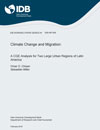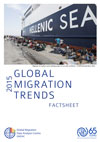-
2015 Migration Factsheet, and the Effects of Policy on Climate-Migration Trends in South America
June 16, 2016 By Sreya PanugantiClimate change is expected to affect rural to urban migration and
 Omar O. Chisari and Sebastian Miller, in a recently released working paper by the Inter-American Development Bank, analyze the various policy options available in two cases: domestic migration to São Paulo, and international migration from Bolivia and Paraguay to Argentina. Migration into cities will impact climate change mitigation strategies. As migrants seek opportunity in urban areas, it is likely they will increase their consumption of more energy-intensive goods and services (like transportation), which will in turn increase emissions. The authors use an economic model to illustrate how policies aimed at reducing emissions, like a carbon tax, could reduce the amount of intra-regional migration from rural to urban areas in Brazil and Argentina. For instance, increasing transfers from the government to individuals, whether through pensions or in direct aid to poor families, could both spur and deter migration. Migrants may find cities where they are included in welfare programs more attractive. Alternatively, these programs could reduce the demand for labor and thereby increase the rate of unemployment, discouraging migration.
Omar O. Chisari and Sebastian Miller, in a recently released working paper by the Inter-American Development Bank, analyze the various policy options available in two cases: domestic migration to São Paulo, and international migration from Bolivia and Paraguay to Argentina. Migration into cities will impact climate change mitigation strategies. As migrants seek opportunity in urban areas, it is likely they will increase their consumption of more energy-intensive goods and services (like transportation), which will in turn increase emissions. The authors use an economic model to illustrate how policies aimed at reducing emissions, like a carbon tax, could reduce the amount of intra-regional migration from rural to urban areas in Brazil and Argentina. For instance, increasing transfers from the government to individuals, whether through pensions or in direct aid to poor families, could both spur and deter migration. Migrants may find cities where they are included in welfare programs more attractive. Alternatively, these programs could reduce the demand for labor and thereby increase the rate of unemployment, discouraging migration. More than one in seven people, or one billion people, were migrants last year, according to the International Organization for Migration (IOM)’s 2015 Global Migration Trends Factsheet. Of this figure, 59.5 million individuals were forcibly displaced due to human rights violations, persecution, conflict, or general violence – the most since World War II. 5,400 migrants are estimated to have died or gone missing as they attempted to cross international borders, up 15 percent since 2014. Syria has the highest number of internally displaced persons worldwide at 7.6 million, or at least 35 percent of the population. More than 19.3 million people were displaced by weather-related disasters. The IOM estimates the likelihood of being displaced by a natural disaster is 60 percent higher today than 40 years ago. Finally, based on a Gallup poll conducted across 140 countries between 2012 and 2014, the IOM says people are more likely to be in favor of migration than they are against it, with the notable exception of Europe.
More than one in seven people, or one billion people, were migrants last year, according to the International Organization for Migration (IOM)’s 2015 Global Migration Trends Factsheet. Of this figure, 59.5 million individuals were forcibly displaced due to human rights violations, persecution, conflict, or general violence – the most since World War II. 5,400 migrants are estimated to have died or gone missing as they attempted to cross international borders, up 15 percent since 2014. Syria has the highest number of internally displaced persons worldwide at 7.6 million, or at least 35 percent of the population. More than 19.3 million people were displaced by weather-related disasters. The IOM estimates the likelihood of being displaced by a natural disaster is 60 percent higher today than 40 years ago. Finally, based on a Gallup poll conducted across 140 countries between 2012 and 2014, the IOM says people are more likely to be in favor of migration than they are against it, with the notable exception of Europe.Sources: Inter-American Development Bank, International Organization for Migration.
 A Publication of the Stimson Center.
A Publication of the Stimson Center.





